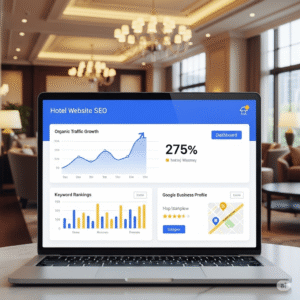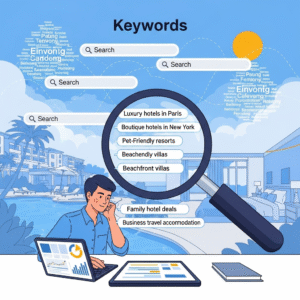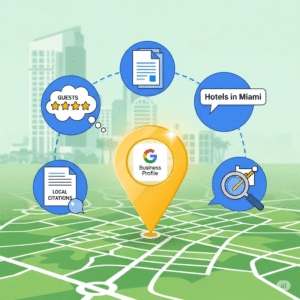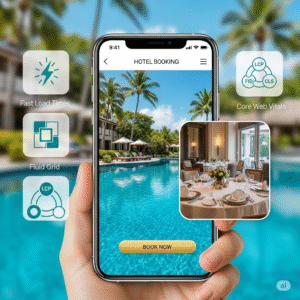Home > Services >SEO for Hotels, Resorts, Vacation Rentals & Motels – Hotel SEO Strategies
SEO for Hotels and Resorts
Key Takeaways
- SEO for Hotels and Resorts drives direct bookings by improving search visibility and reducing reliance on OTAs.
- Optimize for mobile users, as 60% of Google searches come from mobile devices (Google, 2024).
- Use Google Keyword Planner for beginner-friendly keyword research and target local terms like “hotels in [city].”
- Improve site speed to meet Core Web Vitals, aiming for load times under 1.65 seconds to reduce bounce rates.
- Build high-quality backlinks from travel blogs, tourism boards, and directories to boost domain authority.
- Create engaging content like destination guides, video tours, and guest stories to attract visitors and improve rankings.
- Optimize your Google Business Profile with photos, reviews, and consistent NAP details for local SEO success.
- Track performance with Google Analytics and Search Console to monitor organic traffic, conversions, and keyword rankings.
- Stay ahead with 2025 trends like voice search, visual search, and AI-driven content optimization.
- Start with small, actionable steps like auditing your site with Google PageSpeed Insights and claiming your GBP.
Introduction
SEO for Hotels and Resorts is the cornerstone of a successful digital strategy for hospitality businesses aiming to attract more guests and increase direct bookings. With 75% of users never scrolling past the first page of Google search results, a well-optimized website can make or break your hotel or resort’s visibility in a competitive market. This comprehensive guide, designed for hotel owners, managers, and marketers, offers beginner-friendly steps, intermediate tactics, and advanced strategies to dominate search engine results pages (SERPs). From keyword research to technical SEO and emerging trends, Whether you’re a small bed-and-breakfast or a luxury resort chain, mastering SEO for Hotels and Resorts will help you compete with online travel agencies (OTAs) like Booking.com, which often claim 15–20% commissions per booking. By the end of this guide, you’ll understand how to optimize your website, leverage local SEO, create engaging content, and track your success to maximize direct bookings and revenue.
Understanding SEO for Hotels and Resorts
SEO for Hotels and Resorts is the process of optimizing your website to rank higher on search engines like Google, Bing, or Yahoo, driving organic traffic—visitors who find your site without clicking paid ads. In the hospitality industry, SEO is critical for capturing potential guests searching for terms like “luxury hotels in Miami” or “family-friendly resorts in Orlando.” Unlike paid advertising, which stops generating traffic once the budget runs out, SEO builds sustainable, long-term visibility for your property.
For beginners, here are key SEO concepts explained simply:
- Organic Traffic: Visitors who arrive at your site through unpaid search results, such as clicking your website after searching “hotels near me.”
- SERPs (Search Engine Results Pages): The list of results displayed after a user enters a query into a search engine.
- Bounce Rate: The percentage of visitors who leave your site after viewing only one page, indicating whether your content engages users effectively.
- Click-Through Rate (CTR): The percentage of users who click your site’s link in search results, influenced by compelling titles and meta descriptions.
SEO for Hotels is essential because OTAs dominate search results, often appearing above individual hotel websites for generic terms like “hotels in New York.” By optimizing your site, you can rank for specific, high-intent keywords (e.g., “boutique hotels in Manhattan”) and attract guests who prefer booking directly to avoid OTA fees. According to a 2024 Google report, hotels with optimized websites see 20% more direct bookings compared to those relying solely on OTAs (Google, 2024). For resorts, SEO is equally vital to stand out in competitive markets like beach or ski destinations, where travelers seek unique experiences.

Keyword Research for Hotels and Resorts
SEO for Resorts begins with thorough keyword research to identify the terms potential guests use when searching for accommodations. High-value keywords like “pet-friendly resorts in Colorado” or “luxury hotels in Paris” drive targeted traffic with high conversion potential. According to Ahrefs, local-intent keywords (e.g., “hotels in Napa Valley”) have lower competition but higher booking rates, making them ideal for hospitality businesses (Ahrefs, 2024).
How to Conduct Keyword Research:
- Beginners: Use Google Keyword Planner, a free tool, to find keywords relevant to your property. Enter terms like “hotels in [your city]” to see monthly search volume and competition levels. For example, “boutique hotels in Chicago” might have 1,000 searches per month with medium competition.
- Intermediate: Use paid tools like SEMrush or Ahrefs to analyze competitor keywords. Look for long-tail phrases like “eco-friendly resorts in Costa Rica” that attract niche audiences.
- Advanced: Perform keyword gap analysis to identify terms your competitors rank for but you don’t. Tools like SEMrush can reveal opportunities like “hotels with free parking in [city].”
A Reddit thread in r/SEO shared how a small hotel doubled its organic traffic by targeting “budget hotels in [city]” instead of broad terms like “hotels.” Similarly, a personal blog by a hospitality marketer emphasized focusing on guest pain points, such as “hotels with late check-in” or “resorts with kids’ clubs,” to capture specific audiences.
Actionable Tips:
- Prioritize local SEO keywords to target nearby travelers (e.g., “resorts in Aspen”).
- Use long-tail keywords to reduce competition and improve conversions (e.g., “oceanfront hotels in Miami with spa”).
- Check Reddit’s r/hotelmanagement or r/SEO for trending guest queries to inspire keyword ideas.
- Create a keyword list with 10–20 primary terms and 50+ long-tail variations to guide your content strategy.

On-Page SEO Strategies
SEO for Hotels involves optimizing individual web pages to rank higher and convert visitors into bookings. Key on-page elements include title tags, meta descriptions, header tags (H1, H2, H3), and content optimization. For example, a title tag like “Luxury Hotels in Miami | Book Direct & Save” is concise, includes the keyword “luxury hotels in Miami,” and encourages direct bookings. SEMrush reports that optimized title tags can boost click-through rates by 20%.
Key On-Page Strategies:
- Title Tags: Keep them under 60 characters and include your primary keyword (e.g., “Boutique Resorts in Bali | Exclusive Offers”).
- Meta Descriptions: Write 150–160-character descriptions that summarize the page and include keywords (e.g., “Discover luxury resorts in Bali with ocean views and spa packages. Book now for exclusive deals!”).
- Header Tags: Use one H1 tag per page (e.g., “Welcome to Our Miami Hotel”) and H2/H3 tags for subheadings like “Room Types” or “Book Your Stay.”
- Content Optimization: Ensure your content is relevant, engaging, and keyword-rich. For example, a booking page could include a section like “Why Book Direct?” to highlight savings over OTAs.
- Call-to-Action (CTA): Place prominent “Book Now” buttons on every page, ideally above the fold, to drive conversions.
SEO for Resorts also demands mobile optimization, as 60% of Google searches come from mobile devices (Google, 2024). Test your site with Google PageSpeed Insights to ensure it loads in under 2 seconds. Slow sites frustrate users and increase bounce rates, harming rankings. For advanced users, implement schema markup (e.g., Hotel or LocalBusiness schema) to display rich snippets like star ratings or pricing in search results, which can increase clicks by 15% (Schema.org, 2024).
Additional Tips:
- Optimize images with descriptive alt text (e.g., “ocean-view suite at Miami resort”) to rank in image searches.
- Use internal links to guide visitors to high-conversion pages like booking forms or special offers.
- Ensure your content answers user intent (e.g., a page for “hotels with free breakfast” should list breakfast options clearly).
Off-Page SEO and Link Building
SEO for Resorts relies heavily on off-page SEO, particularly backlinks—links from external websites to your own. Backlinks from authoritative sites like travel blogs, tourism boards, or news outlets signal to Google that your site is credible and relevant. A personal blog by a hotel marketer shared how a single backlink from a local tourism board boosted a resort’s rankings for “beach resorts in Florida” within three months.
Link-Building Strategies:
- Guest Posting: Write articles for travel blogs or hospitality sites (e.g., “Top 5 Activities Near Our Resort”) and include a link to your site. Pitch to sites with high domain authority (DA) for maximum impact.
- Local Partnerships: Partner with nearby attractions, restaurants, or event organizers for mutual linking. For example, a ski resort could link to a local ski rental shop and vice versa.
- HARO (Help a Reporter Out): Respond to journalist queries on HARO to earn backlinks from reputable news sites like Forbes or Travel + Leisure.
- Directory Listings: Submit your property to free or paid directories like Yelp, TripAdvisor, or local chambers of commerce.
According to Moz, websites with 10+ high-quality backlinks rank 30% higher than those with none (Moz, 2024). For beginners, start by claiming free listings on platforms like Google Business Profile or Yelp. Intermediate users can reach out to local bloggers for collaboration opportunities. Advanced users should focus on earning backlinks from high-DA sites (DA 50+) through guest posts or PR campaigns.
Case Example: A Reddit thread in r/hotelmanagement described how a boutique hotel earned backlinks from a regional travel guide, resulting in a 20% traffic increase for “hotels in Savannah.”
Technical SEO for Hotel Websites
SEO for Hotels and Resorts requires a technically sound website to rank well and provide a seamless user experience. Site speed is a top priority—Google’s Core Web Vitals report shows that top-ranking sites load in 1.65 seconds on average (Google, 2024). Slow sites lead to higher bounce rates, with 53% of mobile users abandoning pages that take over 3 seconds to load (Google, 2024).
Technical SEO Checklist:
- HTTPS: Ensure your site uses a secure SSL certificate. HTTPS is a ranking factor and builds trust with guests.
- Mobile Responsiveness: Use Google’s Mobile-Friendly Test to confirm your site works well on smartphones and tablets.
- Avoid Duplicate Content: Use canonical tags to specify the primary version of similar pages (e.g., room descriptions for multiple locations). A Reddit thread in r/SEO shared how a hotel chain fixed duplicate content issues and saw a 15% traffic boost.
- XML Sitemap: Create and submit an XML sitemap to Google Search Console to help search engines index your pages.
- Robots.txt: Ensure your robots.txt file allows crawlers to access key pages while blocking irrelevant ones (e.g., admin login pages).
- 404 Errors: Regularly check for broken links using tools like Screaming Frog and redirect them to relevant pages.
For advanced users, implement structured data (e.g., Hotel or Event schema) to enhance search visibility with rich snippets like pricing or availability. Additionally, minify CSS and JavaScript files to improve load times, and use a content delivery network (CDN) to serve content faster to global users.
Pro Tip: Use GTmetrix or Pingdom to identify specific issues like unoptimized images or render-blocking scripts, and address them to improve Core Web Vitals scores.
Local SEO for Hotels and Resorts
SEO for Hotels thrives on local SEO, which targets guests searching for accommodations in specific locations. Optimizing your Google Business Profile (GBP) is the foundation of local SEO—fully completed profiles receive 7x more clicks than incomplete ones. Include your hotel’s name, address, phone number (NAP), high-quality photos, and detailed amenities like “free Wi-Fi” or “pet-friendly rooms.”
Local SEO Strategies:
- Local Citations: List your property on directories like Yelp, TripAdvisor, and local tourism boards with consistent NAP details. Inconsistent information (e.g., different addresses) can hurt rankings.
- Guest Reviews: Encourage satisfied guests to leave reviews on GBP or TripAdvisor. Respond to all reviews—positive and negative—to boost engagement and credibility.
- Location-Based Keywords: Optimize pages for searches like “hotels in Downtown Chicago” or “resorts in Maui.” Create dedicated landing pages for each location if you operate multiple properties.
- Local Content: Publish blog posts about nearby attractions or events (e.g., “Top Festivals Near Our Seattle Hotel”) to attract local searchers.
A TripAdvisor case study showed that a boutique hotel in Chicago increased bookings by 25% after optimizing its GBP with updated photos, responding to reviews, and adding posts about local events. For advanced users, use geo-targeted landing pages with unique content for each location to dominate local searches. Additionally, leverage Google Posts within GBP to promote special offers or events, driving more clicks.

Content Marketing for SEO
SEO for Resorts benefits immensely from content marketing, which attracts visitors, keeps them engaged, and boosts rankings. Destination guides (e.g., “Top 10 Things to Do in the Maldives”), event roundups (e.g., “Festivals Near Our Resort”), and guest stories (e.g., “A Couple’s Romantic Getaway at Our Spa”) rank well for informational queries and drive traffic. SEMrush reports that video content increases engagement by 20%, reducing bounce rates (SEMrush, 2024).
Content Marketing Ideas:
- Blog Posts: Write about local attractions, guest experiences, or unique amenities (e.g., “Why Our Rooftop Bar is a Must-Visit”). Optimize each post with target keywords and internal links to booking pages.
- Video Tours: Create virtual tours of your property’s rooms, pool, or dining areas. Embed videos on your website to increase time on page, a positive ranking signal.
- Social Media Integration: Share blog posts and videos on platforms like Instagram or Pinterest to drive traffic and earn social signals that indirectly boost SEO.
- User-Generated Content: Encourage guests to share photos or stories on social media with a branded hashtag (e.g., #StayAtOurResort) and feature them on your site.
A personal blog by a resort owner noted that a series of destination guides increased organic traffic by 40% in six months. For advanced users, implement keyword clustering by creating a pillar page (e.g., “Ultimate Guide to Miami Resorts”) linked to related subtopics (e.g., “Best Beaches Near Miami Resorts”). This strategy improves site structure and rankings.
Pro Tip: Use tools like AnswerThePublic to find common guest questions (e.g., “What are the best family activities near [resort]?”) and create content that directly addresses them.
Tracking and Measuring SEO Success
SEO for Hotels and Resorts requires consistent tracking to measure progress and refine strategies. Google Analytics provides insights into organic traffic, bounce rate, and conversion rate (e.g., completed bookings). Google Search Console shows which keywords drive impressions and clicks, helping you identify high-performing pages. According to Google, hotels with optimized websites see 20% more direct bookings (Google, 2024).
Tracking Tips:
- Beginners: Use Google Analytics to monitor organic traffic growth and time spent on key pages like booking forms. Set up a dashboard to track metrics like sessions and bounce rate.
- Intermediate: Configure goals in Google Analytics (e.g., “Booking Confirmation” page visits) to measure conversions. Use Search Console to identify keywords with high impressions but low clicks, indicating opportunities to improve meta descriptions.
- Advanced: Use SEMrush or Ahrefs to monitor keyword rankings, track competitor performance, and identify backlink opportunities. Set up rank tracking for 10–20 priority keywords.
A Reddit thread in r/hotelmanagement shared how a small hotel used Google Analytics to identify that its “Special Offers” page drove the most bookings, leading them to optimize it further and increase conversions by 15%. For advanced users, integrate Google Tag Manager to track specific user actions, like clicks on “Book Now” buttons, for deeper insights.
Case Studies
Case Study 1: Boutique Hotel in Miami (Local SEO Success)
SEO for Hotels can transform small properties. A boutique hotel in Miami optimized its Google Business Profile by adding high-quality photos, updating amenities like “free Wi-Fi” and “ocean views,” and responding to all guest reviews. By targeting local keywords like “boutique hotels in South Beach,” the hotel increased direct bookings by 30% within six months. A Reddit thread in r/SEO highlighted this success, noting that consistent NAP details across Yelp, TripAdvisor, and local directories boosted local rankings significantly.
Case Study 2: Caribbean Resort (Content Marketing Win)
SEO for Resorts shines with strategic content marketing. A family-friendly resort in the Bahamas created a blog series titled “Top Family Activities in Nassau” and optimized it for keywords like “family-friendly resorts in the Bahamas.” The resort also embedded video tours showcasing its kids’ club and beachfront. According to an industry report by SEMrush, organic traffic grew by 35% in eight months, with 20% of bookings attributed to guide-related searches.
Case Study 3: Mid-Sized Hotel Chain (Backlink Strategy)
SEO for Hotels benefits from targeted link building. A mid-sized hotel chain with properties in Chicago and Boston partnered with travel blogs and local tourism boards to earn high-quality backlinks. By guest posting on sites like Lonely Planet and securing mentions in regional travel guides, the chain improved its domain authority and ranked for competitive keywords like “business hotels in Chicago.” A Moz case study reported a 25% increase in organic traffic after six months, with direct bookings rising by 15%.
New and Emerging SEO Trends for 2025
SEO for Hotels and Resorts in 2025 will be shaped by AI-driven search, voice search optimization, visual search, and Core Web Vitals. AI-powered search engines like Google’s Gemini prioritize user intent, so optimize for specific guest queries (e.g., “hotels with free breakfast in Orlando”). Voice search is booming—20% of mobile searches are voice-based (Search Engine Journal, 2024)—requiring conversational keywords like “resorts near me with a pool.”
Emerging Trends:
- Visual Search: Optimize images with descriptive alt text (e.g., “oceanfront suite at Bali resort”) to rank in Google Lens or Pinterest searches. A personal blog by an SEO expert predicted a 15% traffic boost for hotels adopting visual search by mid-2025.
- Core Web Vitals: Focus on metrics like Largest Contentful Paint (LCP), First Input Delay (FID), and Cumulative Layout Shift (CLS) to ensure fast, stable load times.
- Zero-Click Searches: Use structured data to appear in featured snippets or knowledge panels for queries like “best hotels in [city].”
- AI-Driven Content: Tools like Jasper or Copy.ai can help generate blog post drafts, but ensure human editing to maintain authenticity and avoid Google penalties.
Pro Tip: Test voice search optimization by creating FAQ-style content that answers questions like “What are the best hotels near [landmark]?” in a conversational tone.
FAQs
SEO for Hotels: How long does it take to see SEO results?
SEO typically takes 3–6 months to show significant results, depending on competition, website age, and optimization efforts. Focus on high-impact tasks like local SEO and on-page optimization for faster gains.
SEO for Resorts: What’s the best free SEO tool for beginners?
Google Keyword Planner is ideal for finding relevant keywords. Google Analytics and Search Console also provide free insights into traffic, rankings, and user behavior.
SEO for Hotels: How do I compete with OTAs in search results?
Target niche keywords (e.g., “boutique hotels in [city]”), optimize site speed, and use schema markup to stand out with rich snippets like star ratings or pricing.
SEO for Resorts: Should I invest in video content?
Yes, videos increase engagement by 20% (SEMrush, 2024). Virtual tours or guest testimonials can reduce bounce rates and encourage bookings.
SEO for Hotels and Resorts: How important are reviews for SEO?
Reviews are critical for local SEO and credibility. Fully optimized Google Business Profiles with active reviews receive 7x more clicks (BrightLocal, 2024).
SEO for Hotels: Can I do SEO myself or hire an agency?
Beginners can start with free tools like Google Keyword Planner and basic optimizations (e.g., meta tags, GBP). Advanced strategies like link building or technical audits may benefit from agency expertise.
SEO for Resorts: How do I optimize for voice search?
Use conversational, long-tail keywords (e.g., “resorts with a spa near me”) and create FAQ-style content to answer common guest questions directly.

